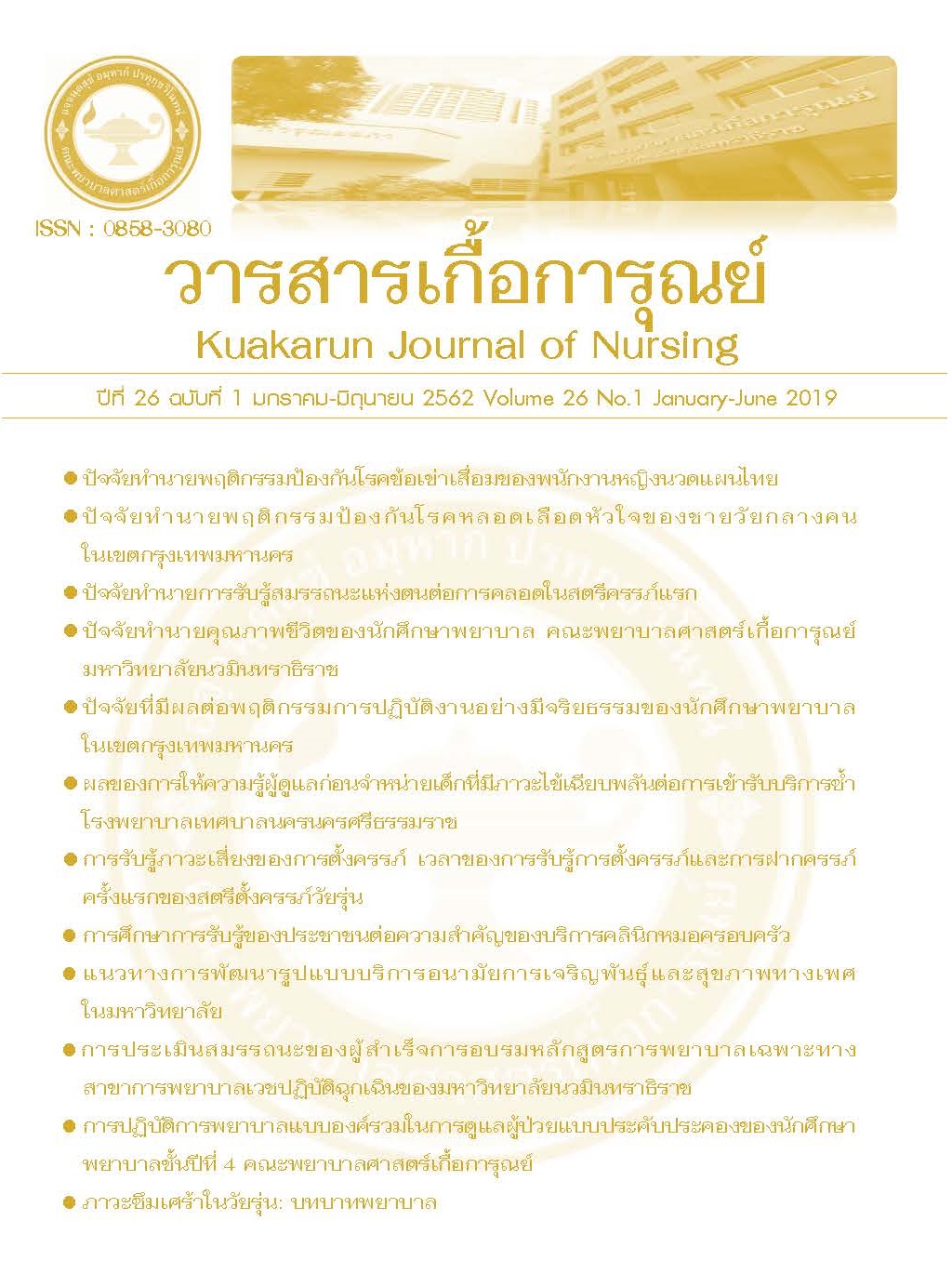The การปฏิบัติการพยาบาลแบบองค์รวมในการดูแลผู้ป่วยแบบประคับประคอง ของนักศึกษาพยาบาลชั้นปีที่ 4 คณะพยาบาลศาสตร์เกื้อการุณย์
คำสำคัญ:
การพยาบาลแบบองค์รวม, การดูแลผู้ป่วยแบบประคับประคอง, การดูแลผู้ป่วยในระยะสุดท้ายบทคัดย่อ
การวิจัยเชิงบรรยายนี้มีวัตถุประสงค์เพื่อศึกษาการปฏิบัติการพยาบาลแบบองค์รวมในการดูแลแบบประคับประคองของนักศึกษาพยาบาลชั้นปีที่ 4 คณะพยาบาลศาสตร์เกื้อการุณย์ที่ผ่านการเรียน ทั้งภาคทฤษฎีและภาคปฏิบัติรายวิชานี้ กลุ่มตัวอย่างคือนักศึกษาพยาบาล ชั้นปีที่ 4 คณะพยาบาลศาสตร์เกื้อการุณย์ จำนวน 187 คน เครื่องมือที่ใช้ในการวิจัยเป็นแบบสอบถามเกี่ยวกับการปฏิบัติการพยาบาลแบบองค์รวมในการดูแลแบบประคับประคอง โดยมีค่าความตรงของเนื้อหา เท่ากับ 1 และนำมาหาความเชื่อมั่นโดยใช้สูตรสัมประสิทธิ์แอลฟาของ ครอนบาค ได้ค่าความเชื่อมั่น 0.97 ได้แบบสอบถามที่สมบูรณ์กับมาทั้งสิ้น จำนวน 174 ฉบับคิดเป็นร้อยละ 93.04 วิเคราะห์ข้อมูลโดยใช้สถิติเชิงพรรณนา
ผลการวิจัยพบว่า กลุ่มตัวอย่างมีการปฏิบัติการการพยาบาลแบบองค์รวมในการดูแลผู้ป่วยแบบประคับประคองโดยรวม มีค่าเฉลี่ยอยู่ในระดับมากที่สุด ( = 4.25, S.D = 0.21) ด้านที่มีค่าเฉลี่ยสูงสุด ได้แก่การดูแลด้านจิตใจ/อารมณ์ มีค่าเฉลี่ยอยู่ระดับมากที่สุด (
=4.34, S.D = 0.16) รองลงมาเป็นการดูแลด้านร่างกายค่าเฉลี่ยอยู่ในระดับ มากที่สุด (
= 4.262, S.D = 0.24) และการดูแลด้านจิตวิญญาณอยู่ในระดับมากที่สุด (
= 4.258 S.D = 0.17) เช่น เดียวกัน โดยด้านที่มีค่าเฉลี่ย โดยรวมต่ำที่สุดในการปฏิบัติการพยาบาล แบบองค์รวม ได้แก่ การดูแลด้านสังคมและสิ่งแวดล้อมค่าเฉลี่ยอยู่ในระดับ มาก (
= 4.14, S.D = 0.23) ผลการวิจัยสามารถนำไปใช้ในการเพิ่มเติมเนื้อหาในรายวิชาการพยาบาลผู้ป่วยแบบประคับประคอง ในส่วนที่เกี่ยวข้องกับการดูแลด้านสังคมและสิ่งแวดล้อมในการปฏิบัติการพยาบาล งานวิจัยครั้งต่อไป ควรศึกษาความต้องการของผู้ป่วยและญาติในการดูแลในระยะสุดท้าย รวมทั้งการแสดงเจตนาเกี่ยวกับการรักษาไว้ล่วงหน้า
เอกสารอ้างอิง
Delgado, C. (2007). Meeting clients’ spiritual needs. Nursing Clinics of North America, 42 (2), 279-294.
Erickson, H. L. (2007). Philosophy and theory of holism. Nursing Clinics of North America, 42 (2), 139-164.
Hopkinson, J. B. (2001). Facilitating the development of clinical skills in caring for dying people in hapital. Nurse Education Today, 21, 632-639.
Izumi,S. Nagae, H.,Sakurai,C., & Imamura,E (2012).Defining end-of-life care from perspectives of nursing ethics.Nursing Ethics.19(5),608-618.
King, M. O., & Gate, M. F. (2007). Teaching holistic Nursing: The legacy of Nightingale. Nursing Clinics of North America, 42 (2), 309-334.
Krakauer, E.L., & Crenner, C. (2002). Barriers to optimum end-of-life care for minorityPatients. Journal American Geriatrics Society, 50 (1), 182-190. Lloyd-Williams, M., & Field, D. (2002). Are undergraduate nurses taught palliative careduring their training? Nurse Education Today, 22, 589-597.
Matzo. M. L., & Sherman, D. W. (2006). Palliative Care Nursing: Quality care to the end of life (2nd.). New York: Springer Publishing.
Robinson, R. (2004). End-of-life education in undergraduate nursing curricula. Dimensions of Critical Care Nursing, 23 (2), 89-92.
Rousseau, P. (1998). Palliatice care in mamaged medicare: Reasons for hope- and for concern. Geriatrics, 53 (11), 59-65.
Taylor, B. (2004). Technical, practical, and emancipatory reflection for practicing holistically. Journal of Holistic Nursing, 22 (1), 73-84.
Taylor, B. (1998). The nurse-patient relationship as the common ground of nursingspecialties. Australian Journal of Advanced Nursing, 15 (3), 6-7.
Touhy, T.A., Brown, C., & Smith, C. J. (2005). Spiritual caring: End of life in a nursingHome. Journal of Gerontological Nursing, 31(9), 27-35.
White, K. R., Coyne, P.J., & Patel, U. B. (2001). Are nurses adequately prepared for end-of-life care? Journal of Nurse Scholarship, 33 (2), 147-152.

















